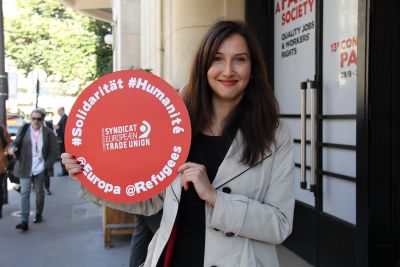
Statement from the ETUC Mobility, Migration and Inclusion Committee
Stop discriminating against refugees on grounds of nationality!
The ETUC has received information from informal and informal sources around the so-called ‘Balkan route’ of entry to the EU that since 19 November 2015, the states of FYROM Macedonia, Serbia, Croatia and Slovenia have been allowing only Syrians, Iraqis and Afghanis to enter their countries.
UNHCR Spokesperson Melita Šunjić said on 19 November that Serbia and FYROM Macedonia had started to admit only refugees from Syria, Afghanistan and Iraq and that hundreds of refugees are stuck at the border. Latest media reports indicate that a group of refugees stranded at the Greece-Macedonia border has started a hunger strike in protest against a filtering system rejecting those classed as ‘economic migrants’.
Moreover, trade union sources are concerned that Italy’s approach seems already to be leading to the unjustified expulsion of certain newcomers because of the biased view that only Syrians and Eritreans deserve protection.
The European Trade Union Confederation (ETUC) strongly condemns any collective discrimination against refugees. Everyone has the right to claim asylum at the borders of any country. The Qualification Directive (2011/95/EU) is very clear that: “assessment of an international protection application for international protection is to be carried out on an individual basis”. Furthermore, EU rules on fundamental rights prohibit the collective expulsion and refoulement of asylum-seekers.
The ETUC is therefore calling on all countries that are not respecting the legal asylum procedure to halt this illegal and shameful practice right away. We demand that all asylum-seekers should be registered and protected with a temporary permit. This would help national and European authorities to take greater control of the situation, to speed up welcoming procedures, to have sufficient time and resources to evaluate applicants’ individual situations and, most of all, to protect all those who comply with international obligations and avoid people straying into EU territory without documents.
